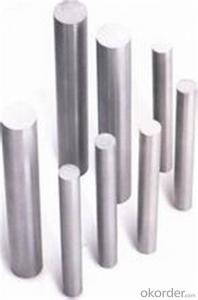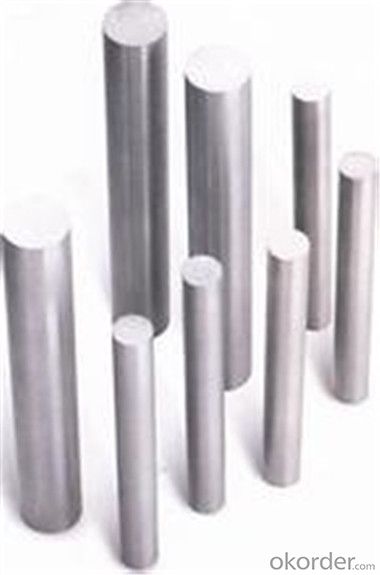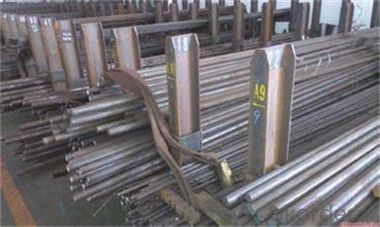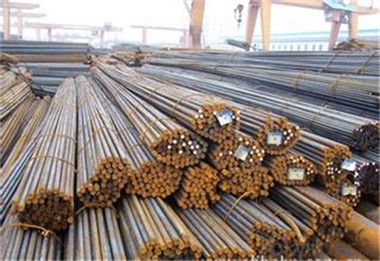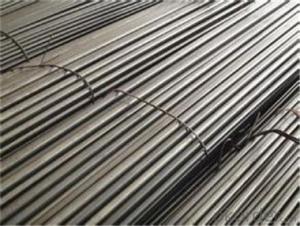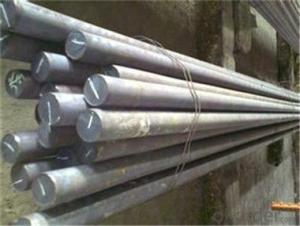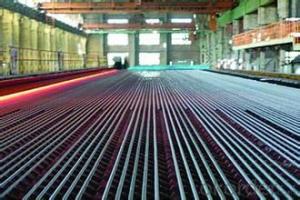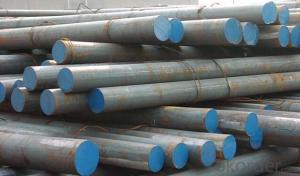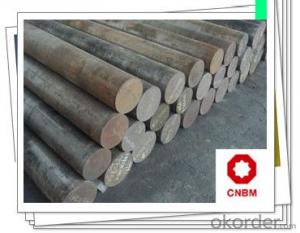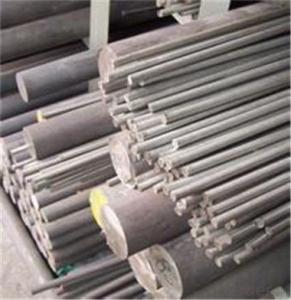GB1499.2 TOP A36 Steel Round Bars Free Cutting from China
- Loading Port:
- Shanghai
- Payment Terms:
- TT OR LC
- Min Order Qty:
- 44 m.t.
- Supply Capability:
- 2000000 m.t./month
OKorder Service Pledge
OKorder Financial Service
You Might Also Like
Specification
Description of steel round bar:
Cold Drawn Round Bar
1.Diameter:4mm-120mm
2. Lengh:According to customers' requirements
Festures of steel round bar:
4340 Forged Round Steel Bar
1.Dia 80-800mm Length:2000-13000mm or as required
2.Technique:Forged
3.Delivery Time:45 days
Specifications of steel round bar:
1. Standards: AISI 4340 8620 8640 4320 , JIS SNCM8 GB:40CrNiMoA
2. Specification: Dia: 80~450mm Length:2000-13000mm or as required
3. Chemical Composition (%):
C | Si | Mn | S | P | Cr | Ni | Cu | Mo |
0.37-0.44 | 0.17-0.37 | 0.40-0.80 | 0.025(max) | 0.025(max) | 0.60-0.90 | 1.25-1.65 | 0.025(max) | 0.15-0.25 |
Images of steel round bar:
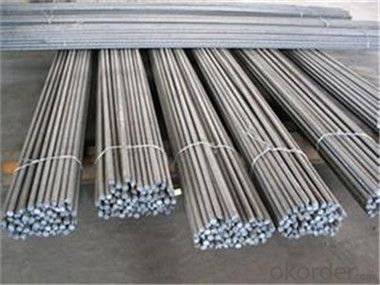
FAQ:
1. What is your package?
Packing situation: standard seaworthy packing or as customer required.
2. How long is the lead time?
Delivery time: 45 days after order confirmed.
3. What payment term do you accept?
Payment: T/T or L/C at sight.
- Q: Are steel round bars used in the construction industry?
- Yes, steel round bars are commonly used in the construction industry. They are often used as structural elements, such as reinforcement in concrete structures, as well as in the fabrication of various components and fittings.
- Q: What is the difference between hot working and cold working of steel round bars?
- Steel round bars can be shaped and manipulated using two different methods: hot working and cold working. Hot working involves shaping steel at high temperatures, typically above the steel's recrystallization temperature. This makes the material more malleable and easier to shape. The processes involved in hot working include forging, rolling, and extrusion. Hot working has several advantages. It allows for the creation of complex shapes and sizes with minimal force or energy. It also improves the mechanical properties of the steel, such as strength and toughness, by refining its grain structure. However, hot working can cause oxidation and scale formation on the steel's surface, which may require additional treatments or cleaning. On the other hand, cold working refers to shaping steel at room temperature or below its recrystallization temperature. Cold working processes include bending, drawing, and cold rolling. Unlike hot working, cold working does not require heating the steel, which reduces energy consumption and production costs. It also results in a smoother surface finish and tighter tolerances compared to hot working. Cold working can increase the hardness and strength of the steel, making it suitable for applications that require higher mechanical properties. However, it can also make the steel more brittle and prone to cracking. In conclusion, the main difference between hot working and cold working steel round bars lies in the temperature at which the shaping process takes place. Hot working is done at high temperatures, making shaping easier and improving mechanical properties. Cold working, on the other hand, is done at room temperature or below, resulting in tighter tolerances and increased hardness. The choice between hot working and cold working depends on the desired properties and characteristics of the final product.
- Q: What are the different joining methods for steel round bars?
- There are several different joining methods that can be used for steel round bars, depending on the specific application and desired outcome. Some of the most common joining methods for steel round bars include welding, brazing, and mechanical joining. 1. Welding: Welding is a popular method for joining steel round bars. It involves melting the edges of the bars and fusing them together using heat. Various welding techniques such as arc welding, MIG welding, TIG welding, and spot welding can be used, depending on the thickness and type of steel being joined. Welding provides a strong and permanent bond, making it suitable for heavy-duty applications. 2. Brazing: Brazing is another method used to join steel round bars. It involves heating the bars and melting a filler metal that has a lower melting point than the steel. The molten filler metal is then drawn into the joint by capillary action, creating a strong bond when it solidifies. Brazing is often used when the base metals have different melting points or when a lower-temperature joining process is required. 3. Mechanical joining: Mechanical joining methods do not involve any heat or melting of the steel round bars. Instead, they rely on mechanical means to hold the bars together. Examples of mechanical joining methods include bolted connections, riveting, and clamping. These methods are often used when disassembly or adjustability is required, as they provide a non-permanent joint that can be easily undone. It is important to consider factors such as the strength requirements, environmental conditions, and the specific application when choosing a joining method for steel round bars. Each method has its own advantages and limitations, and the appropriate joining method should be selected to ensure a secure and durable bond between the round bars.
- Q: Lightning protection earthing zinc plating flat iron and round steel welding method, need to flat iron wrapped in round steel outside welding?
- Don't need, but the welding seam area not less than round or flat between the relatively small cross section, the weld to coated with anticorrosive paint. Generally speaking, the grounding part does not use steel, galvanized L type flat iron good effect (copper strip and galvanized L type flat iron is not much, just life is long, but the cost is much higher), round only used as grid wiring.
- Q: Can steel round bars be used for making handrails?
- Yes, steel round bars can be commonly used for making handrails due to their durability and strength.
- Q: Can steel round bars be used in the automotive parts industry?
- Indeed, the automotive parts industry does make use of steel round bars. These bars, renowned for their remarkable strength, resilience, and ability to withstand wear and tear, are frequently employed in the production of diverse automotive components. By shaping and sizing these bars to suit the specific needs of axles, drive shafts, suspension components, steering components, and gears, manufacturers ensure that automotive parts are crafted to the highest standards. The utilization of steel round bars guarantees the structural soundness and dependability of these components, rendering them perfectly equipped to endure the rigorous conditions and burdens encountered in the automotive sector.
- Q: What is the maximum temperature steel round bars can withstand?
- The maximum temperature that steel round bars can withstand depends on the specific grade and composition of the steel. However, most standard carbon steels can typically withstand temperatures up to approximately 1000°C (1832°F) before their mechanical properties begin to significantly degrade.
- Q: Can steel round bars be used for making cutlery or kitchen utensils?
- Yes, steel round bars can indeed be used for making cutlery or kitchen utensils. Steel is a popular choice for kitchen utensils due to its strength, durability, and resistance to corrosion. However, the specific type of steel and the production process used will determine its suitability for culinary purposes. Stainless steel, for example, is highly recommended for cutlery and kitchen utensils as it is resistant to rust and stains, easy to clean, and does not react with food. Additionally, steel round bars can be easily shaped and formed into various utensil designs, making them a versatile material for cutlery and kitchenware manufacturing.
- Q: Can steel round bars be used for making sway bars?
- Certainly! Sway bars can indeed be crafted using steel round bars. These bars, also recognized as stabilizer bars or anti-roll bars, are implemented in automobiles to diminish body roll and enhance stability while maneuvering corners. The utilization of steel round bars is quite prevalent for this task owing to their remarkable robustness and endurance. The circular form facilitates the uniform dispersion of forces and furnishes crucial torsional stiffness necessary for sway bars to effectively govern body roll. Furthermore, steel is effortlessly obtainable, economical, and can be conveniently shaped and sized to cater to sway bar requirements.
- Q: How do you calculate the moment of inertia for a steel round bar?
- To determine the moment of inertia for a steel round bar, one can utilize the equation for the moment of inertia of a solid cylinder. Denoted as I, the moment of inertia signifies an object's resistance to rotational changes. The equation for the moment of inertia of a solid cylinder is as follows: I = (1/2) * m * r^2 Where: - I represents the moment of inertia - m denotes the mass of the cylinder - r signifies the radius of the cylinder To calculate the moment of inertia for a steel round bar, it is necessary to possess knowledge of both the bar's mass and radius. The mass can be determined by multiplying the steel's density by the cylinder's volume. The volume of a cylinder is given by the subsequent formula: V = π * r^2 * h Where: - V symbolizes the volume - r stands for the radius - h represents the height or length of the round bar After obtaining the mass and radius, one can then substitute these values into the formula for moment of inertia to compute it. It is crucial to ensure unit consistency during this process (e.g., converting centimeters to meters if the radius is initially given in centimeters). It is important to note that the aforementioned formula assumes that the steel round bar is a solid cylinder. Should the bar possess a different shape or contain hollow sections, these factors must be taken into consideration when conducting the calculation.
Send your message to us
GB1499.2 TOP A36 Steel Round Bars Free Cutting from China
- Loading Port:
- Shanghai
- Payment Terms:
- TT OR LC
- Min Order Qty:
- 44 m.t.
- Supply Capability:
- 2000000 m.t./month
OKorder Service Pledge
OKorder Financial Service
Similar products
Hot products
Hot Searches
Related keywords
